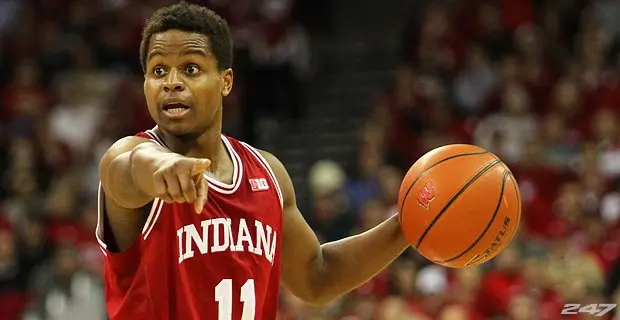Kevin Yogi Ferrell left Indiana University as one of their best players in franchise history. Unfortunately, this was not enough to get him drafted. Ferrell averaged 17.1 points, 4.3 rebounds, 6.1 assists, and 1.3 steals per game while shooting 44.7 percent from deep and 47.9 from the floor during his senior year. He even left Indiana as the school’s all-time leader in assists.
At only six feet, 180 pounds, and 23 years old, Ferrell was labeled as under-sized and a finished product. With concerns about how he would fare against NBA size and his defense at the next level, teams weren’t too keen on selecting him. But throughout the pre-draft process, one team remained interested and saw something special in Ferrell: the Brooklyn Nets.
In an interview with Jake Hyman of Ridiculous Upside, Ferrell detailed how his workouts led to a one-year, $100,000 guaranteed free agent deal following going undrafted.
“Even my pre-draft workouts; they believed in my ability on the court,” Ferrell told Ridiculous Upside. “I felt like with the minutes I got on the court, I proved to them that I could be a valuable asset on the team.”
Ferrell was brought on to play backup/reserve point guard. During Summer League and preseason, he has been consistent in that role. In Summer League, he averaged 8.5 points, 1.5 rebounds, 1.75 assists, and .75 steals per game in 16.9 minutes of action. So far in preseason, Ferrell has averaged 6.5 points, 1.5 rebounds, two assists, and one steal per game in 13.7 minutes.
With Jeremy Lin and Greivis Vasquez on the roster and Isaiah Whitehead and Chris McCullough being sent to the Long Island Nets, it looks like there is a role for Ferrell on this squad. He had a good stroke from deep in college and is extremely comfortable running the pick-and-roll, thanks to IU head coach Tom Creen’s pro-offense style. There are some things he needs to work on if he wants a distinct role going forward.
Ferrell needs to become a much more consistent shooter at the NBA level. In four Summer League games, he shot at an abysmal 18.2 percent from deep. He averaged 2.75 shots per game from long distance, a realistic sampling of what he should be taking in a reserve point guard role, and made only 0.50 shots per game.
Things like learning your place in the offense and general nerves usually account for a fluctuation in numbers. So far this preseason, he is averaging a more impressive 50 percent from deep in two games played, hitting one of two shots from deep per contest.
In addition to poor shooting numbers, Ferrell also has a poor assist to turnover ratio for a reserve point guard. In Summer League, he averaged 1.75 assists to 2.25 turnovers and in preseason, he currently averaging two assists to two turnovers. If he wants first-year head coach Kenny Atkinson to hand him the keys to the bench unit, he will need to have a positive ratio.
Playing reserve point guard isn’t an easy job. Coaches want someone that can come in cold, set up other guys in the offense, hit shots, and not give up the farm on defense. Ferrell still needs to adjust to the size and speed of the NBA, but looks like he can fill that role nicely for the Nets one day.
Given that Ferrell has $100,000 of guaranteed money on the books, it is unlikely that he won’t make the final roster. But even if he does, he should welcome assignments to the new D-League affiliate, the Long Island Nets. The D-League is the perfect place for undersized guards to come in and adjust to the pace of the game, tighten up flaws in their game, and build their confidence for when they are called back to the NBA.
Ferrell already has an excellent relationship with Long Island Nets head coach Ronald Nored. During Summer League, Ferrell got close with Nored, Atkinson, and assistant coach Jordan Ott.
“Those guys helped me on the court,” Ferrell said. “Sometimes I get out of character, maybe try to force things and they try to tell me to calm down. After games, I watch film with the coaches. I’m a big film guy and especially like doing that.”
This relationship only helps Ferrell understand the game more and further proves that the team is ready to make a real investment in his future. Barring any unforeseen injuries or catastrophes, Ferrell will most likely be the team’s third point guard and spend time with both Brooklyn and Long Island.
Given how close the commute is, Ferrell can be at practice in Brooklyn, play a game for Long Island that night, and be available for Brooklyn the next day. This convenience is exactly why the current trend of relocating or purchasing D-League teams within driving distance of the NBA franchise is occurring.
Regardless of where Ferrell spends most of his time, his guaranteed money and commitment from the coaching staff are clear signs that he is sticking around in Brooklyn this year and possibly the foreseeable future. Young talent like Yogi Ferrell will be hard to come by for Brooklyn, given their situation in the draft. It is clear that he is a hard worker that is committed to sticking in the NBA; all he needs is the opportunity to shine.

